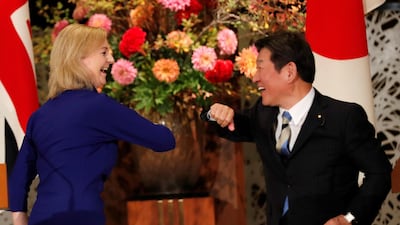Britain signed its first major post-Brexit trade deal on Friday when it agreed a wide-ranging pact with Japan.
The agreement, estimated to boost trade by £15 billion ($19.5bn) between the two countries, came as Britain struggles to make headway on a package with the European Union.
The Japan-UK deal has a particular focus on exports in the food and drink, finance and tech sectors, and aims to reduce red tape for British beef and salmon farmers.
It also includes brand protection for British goods, including English sparkling wine, Yorkshire Wensleydale cheese and Welsh lamb.
Financial services make up Britain’s biggest export to Japan, now at 28 per cent.
In return, the UK government says consumers will be able to buy "cheaper, high-quality Japanese goods - from udon noodles to Bluefin tuna and Kobe beef".
The signing ceremony took place in Tokyo between the UK's international trade secretary Liz Truss and Japan's Foreign Minister Toshimitsu Motegi.
"How fitting it is to be in the Land of the Rising Sun to welcome in the dawn of a new era of free trade," Ms Truss said in Tokyo.
When the deal was announced last month, Britain said it meant around 99 per cent of its exports to Japan would be tariff-free.
Under the current EU-Japan trade agreement, in place since February 2019, the vast majority of custom duties are also absent.
"In terms of market access, we have maintained Japan's high level access to the UK market as under the Japan-EU deal," Mr Motegi said.
"And for some products such as train carriages and auto parts, we have improved access," he added.
The deal includes new provisions on digital trade that aim to ease the flow of data, among other changes.
"This deal doesn't just preserve existing benefits, but it strikes out in services like digital and data, where the UK and Japan both have strengths, and hope to collaborate in future," said Ms Truss.
Japan's existing free trade agreement with the European Union includes Britain only until the end of this year, as it exits the EU.
Japan already exports about £10.7bn of goods to Britain, mostly autos, auto parts and other machinery, while importing nearly £7.26bn worth from Britain, including pharmaceuticals, medical products and cars, according to the Japanese foreign ministry.
Tariffs on Japanese vehicles are removed gradually and won’t become zero until 2026, the same as the terms of the deal Japan has now with the EU.
Tokyo has repeatedly expressed concerns about Japanese businesses in Britain, which include Hitachi, with plants making railway cars for East Coast trains, and Nissan, employing several thousand workers at its Sunderland auto plant.
Mr Motegi went to Britain in August, his first overseas trip amid the coronavirus pandemic, during which he stressed the importance of reaching a trade deal quickly.
Meanwhile, UK junior finance minister Stephen Barclay said on Friday that a post-Brexit trade deal with the EU was still possible, but only if Brussels respects British sovereignty over fisheries.
"But that deal needs to reflect that fact that we're leaving the EU, we will regain control of our fisheries - it was a key issue for many of your viewers during the Brexit debate and it is important that the deal reflects that," he told Sky News.


